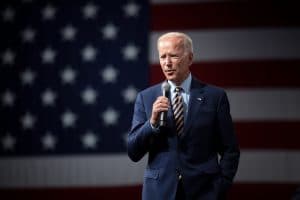Last week the White House announced that the Summit for Democracy promised by Joe Biden will take place virtually on December 9 and 10 in order to “galvanize commitments and initiatives across three principal themes: defending against authoritarianism, fighting corruption, and promoting respect for human rights.” An in-person summit of world leaders is then to gather in 2022, “following a year of consultation, coordination, and action.”

While Democracy Without Borders primarily advocates global democracy in the sense of strengthening democratic representation and participation in institutions such as the UN, we understand that the vision of a democratic global community, as outlined in our long-term Theory of Change, is only possible if democracy thrives and prospers at all levels.
Recent trends of democratic backsliding and autocratization across the world are a cause for great concern. This has strong implications. Democracy is a precondition for effective provision of human rights and without human rights, there is no democracy. Last year we endorsed a joint statement warning that democracy is under threat and must be defended. It has been argued that if there is a tipping point for global democracy, we may be nearing it.
In March this year, when Freedom House and V-Dem published their latest findings on the state of freedom and democracy in the world, I published some personal views on the rationale of a club of democracies in this opinion piece. In subsequent consultations with experts and activists it became apparent that there is a general consensus that democratic countries need to collaborate much more closely. However, there are different views on how best to achieve this and what the priorities should be.
At Democracy Without Borders, we have come to the conclusion that a new Alliance of Democracies – or call it a league or club – can be useful to help defend and strengthen democracy. However, this strongly depends on the exact design and goals. The latter should include and enable a critical assessment of democracy promotion to date.
The following thirteen points, approved by our international governing body, are our tentative contribution to this debate:
Thirteen points on an Alliance of Democracies
Democracy Without Borders in principle supports a Summit for Democracy (Summit) and the creation of an Alliance of Democracies (AoD). By doing so, we advocate the following principles and proposals:
- A key purpose of the Summit should be to pave the way for the establishment of an AoD.
- While set up and operated by governments, the Summit and AoD should not be exclusively intergovernmental. Parliamentarians and representatives of civil society organizations need to be part of the deliberation and decision-making procedures. Their involvement must be more than mere tokenism.
- We recommend that an AoD includes and operates two separate networks, a parliamentary network and a civil society network which have substantial ways to participate, going beyond a merely observing or consulting role.
- The AoD should be inclusive and open to all states that are rated free or at least partly free according to established research. Expanding the G-7 to a D-10 might be a first step but not sufficient in the long run.
- Democratic opposition leaders and civil society groups from all countries should be allowed and encouraged to participate.
- The purpose of an AoD should be twofold: (a) to look into common root causes of democratic backsliding internally, at the level of member states, and identify ways of how to strengthen democracy at home and (b) to develop joint policy and action on how to promote and defend democracy externally.
- Consideration should be given for an AoD to establish a transnational citizens’ assembly that would help develop recommendations on (a) and (b), complementing the intergovernmental, parliamentary and civil society dimensions of the process.
- The AoD can be a forum to decide on joint smart sanctions, if considered useful and appropriate, vis-à-vis governments that are responsible for gross human rights abuses and for gross interference into the democratic process of AoD member states.
- The AoD should not be misused as an instrument for pursuing geopolitical objectives and to target specific states only. Its action should be informed by value-based considerations only.
- The AoD should not be seen or used as an alternative forum that replaces existing multilateral organizations and their mandates. However, the AoD should put a priority on facilitating more coordinated value-based action and policy of member states within such organizations, in particular the United Nations. For this purpose, the AoD should revive and re-establish a UN Democracy Caucus.
- In the external field, DWB believes that the AoD, in addition to other things, should push for democratic reforms of existing institutions of global governance, in particular a UN Parliamentary Assembly and a UN World Citizens’ Initiative.
- The AoD needs to have a permanent secretariat and a formal governance structure.
- It needs to be explored whether and under what conditions the existing Community of Democracies may be able to play the role of the AoD as outlined before. In principle, DWB believes that duplicate and parallel structures and activities should be avoided.





